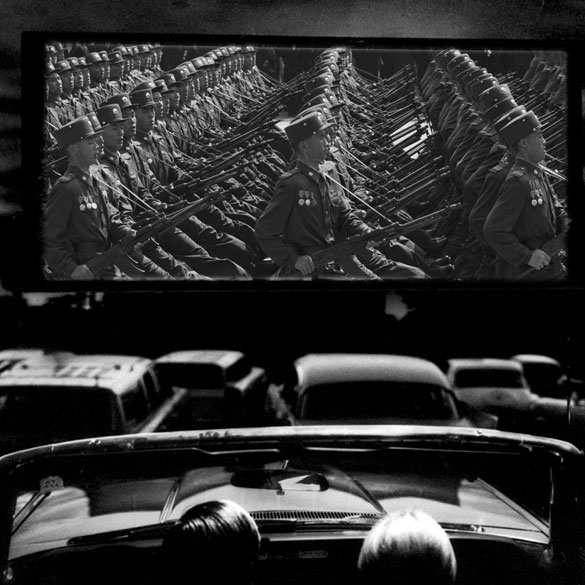Not so long ago I used to commute by train from Philadelphia, Pennsylvania (where I lived) to Wilmington, Delaware (where I worked). It was not the most pleasant commute. Most of the land adjoining the tracks was unkempt, and Winter, Spring, Summer, or Fall, the view beyond the tracks was uniformly drab.
Between Philadelphia and Wilmington were several stadiums and arenas – the largest of which could seat more people than lived in Philadelphia during the War of Independence, which was fought at a time when Philadelphia was the second largest English-speaking metropolis in the world. Of course, during my morning commute, these stadiums were empty – vast hulks of modernity injected between two not-so-thriving urban outposts, remnants from America’s lost colonial past. That is an unsettling thought, or, at least, it would be, if post 9/11, we could let anything, short of actual war on American soil, unsettle us.
I kept pretty much to myself on these trips. Not that there were many people to talk to. My trip was against the flow of commuter traffic – far more people commuted from Wilmington to Philadelphia, than the other way round (as I did). There were a lot of empty seats. There were a few nurses or people studying to be nurses. Condé Nast had a Wilmington presence, and several people on my train worked for that publisher. There were a few students studying in Wilmington-area schools, such as Widener University.
There were also a good number of ethnic South Asians, who, much as I did, kept pretty much to themselves, and, often spoke, what I guessed, was their native language. Hindi? Bengali? Urdu? I really did not know. Occasionally, they spoke to one another in English and I made out that most of them were using their commuting time to study for various qualifying examinations relating to dealing in securities and insurance products, or for certification in accountancy or actuarial studies. So they were busy. And I was not particularly talkative; often using my commuting time to read the day’s news or to read about current developments in my field.
One day one of these young men, sitting just across from me, introduced himself and he just started talking. I will call him M. for short. Why he just started talking to me I cannot be sure. But it is interesting to speculate. I guess, and it is just a guess, it is because I am Jewish. Not just Jewish, but obviously Jewish – I wear a kippah and have a long flowing beard. As I later learned, he did not know any Jews growing up in predominantly Islamic Bangladesh, and although he probably knew some Jews from his place of work – an international merchant bank – he probably did not know any who looked much like me. Delaware is not New York. As for me, I have not known many South Asians; certainly more than zero, but not many. But even so, in the social milieu of work – where I knew them – we rarely discussed history, politics, or faith.
These were precisely the things M. wanted to talk about. He might have been just as happy to discuss these things with his co-nationals and co-religionists. But, as I explained, the other South Asians were deeply immersed in exam preparation. So there was just me. Or, perhaps he preferred to speak to me? That is possible too.
Over time I began to look forward to our morning conversations. M. really was a pleasure to talk to. First, he avoided the language of conspiracy and fraud, and its Marxist linguistic cousin: exploitation. Quite the opposite: he thought his country’s fate was in his countrymen’s hands. He had a genuine affection for both. It was a patriotism rooted in the modest achievements of his country since gaining independence from the British and later from Pakistan. It was not a parochial patriotism . . . rooted in we’re great because we are better than our neighbors and cousins in nearby Khyberstan. It was a thoroughly modern patriotism connected to real achievements, not ancient feuds. The past was just that: the past. It was not an excuse for a failed present.
And for my part, I was a good audience. I had a rough outline of the history of South Asia, Bangladesh included. I knew the names of the main players and parties. I was genuinely interested in what he had to say because he knew the facts on the ground as they were developing. We discussed genuine news. The sort CNN ought to report, but doesn’t; the sort The Economist used to report, but doesn’t anymore. Perhaps that is too harsh. What we were discussing was not newsworthy in the traditional sense – as it only in the most tangential sense involved Europe, the United States, and the West. Rather, it was about the great race of life in Asia. The competition between Malaysia and Indonesia; China’s ongoing efforts to dominate the South China Sea, Vietnam’s unwillingness to kowtow to China, and Vietnam’s somewhat unexpected rapprochement with the United States; whether India, as it had subsumed Sikkim and Goa, would also swallow up Nepal and Bhutan, and how China would react to that. The West maybe could influence the players and events, but it could not control them.
Occasionally, he did say the odd thing or two. He once told me that he was of the belief that Bangladesh should recognize Israel. He said he had made a statement to that effect in a public forum back home – where he voiced the complaint that Bangladesh would have recognized Israel long ago but for that fact that the two dominant political parties were bankrolled by Middle Eastern sheikhs, and that, in making those statements, he had put his life at some real risk. He told me that later that day his father told him it was time to go to England to continue his studies. Were the two events connected? Did the events really happen as he had told me? Or, was the entire story contrived for my benefit, the puffery of a young man?
One day M. asked me a question. It was a question he probably did not intend to ask. Our conversation went something like this.
M.: You know, I have known Pakistanis my whole life. But I don’t understand them.
A.: What do you mean? What is it about Pakistanis that you do not understand?
M.: They treat us oddly. Sometimes when I meet Pakistanis, they treat us like long-lost brothers. As friends, almost as family. But other times, not so much. Sometimes it is quite obvious that they look down on us. But who are we that they should look down on? Their attitude just doesn’t make any sense. After all, we won the civil war. And that’s why there is an independent Bangladesh today.
A.: Yes, I think you are probably right about that. I could explain it to you.
M.: You could explain it, to me?
A.: Well, um, yes, I am afraid so.
M.: A., I have known South Asians and Pakistanis my whole life. I have friends and family all over Bangladesh, India, and Pakistan too. How many Pakistanis have you ever known?
A.: Not many, less than a dozen, maybe less than half a dozen.
M.: OK, I am all ears. <laughing gently> Tell me why you think Pakistanis act the way they do.
A.: The thing of it is . . . well, I could explain it to you, but I do not think I should.
M.: Why ever not?
A.: Well, the reason they act as they do, by which I mean my best guess as to the reason, is not one which I agree with. But you might take offense and believe that I think their view is correct or reasonable.
M.: Let me see if I understand you. You think you know the reason that Pakistanis act as they do, but you won’t tell me because you think I’ll take offense and ascribe the reason to you as one you share?
A.: Yes, that is it in a nutshell.
M.: OK, A., I am a traditional Muslim. I keep all the holy days and fasts. But, I am also thoroughly Western. If you tell me the reason is one that you don’t agree with, I won’t fault you for believing (rightly or wrongly) that Pakistanis may think it.
A.: I really do not know. Are you sure this is something you want to hear? You really are not going to like it.
M.: Yes, I am sure.
A.: OK, but, again, you are not going to like it.
I suspect that the reason some Pakistanis look down on some Bangladeshis some of the time . . . is that they think Bangladeshis are . . . are . . . the children of raped women.
Of course, this view is not unique to Pakistanis and Bangladeshis. There are more than a handful of Iranians and Afghanis who feel the same way about Pakistanis (leaving some Pakistanis – in their turn – feeling irked). And there are more than a few Iraqis who feel this way about Iranians.[1]
And there are a fair number of Arabs from the Arabian Peninsula, how many I cannot say, who feel this way about Iraqis, Egyptians, Berbers, in other words, about basically every other Muslim.
We then had about two minutes of silence as the train rolled on.
M.: I think you may be right about this. Indeed, there are many families in Bangladesh which have purposely rewritten their family records to reflect that they are descended from immigrants from Bihar, a neighboring province in India, as opposed to being of pure Bangladeshi or indigenous descent.[2]
However did you know?
A.: You see in the Middle East and North Africa, many Arabs (not just Muslim ones, but also some Christian Arabs) believe Jews think the same thing about Arabs – many Arabs believe that we Jews think that Hagar [the mother of Ishmael] was a raped woman. In other words, they believe that we think they are descended from a raped woman. And some of them believe it themselves. They believe it because that is just the way of the world – that is just how all men they have ever known or heard about have acted. And if some men somewhere during war time did not act that way, then that means that those men were either timid or weak.
The sad truth of it is that we don’t think in these terms about Abraham, Hagar, Ishmael, or Arabs; we don’t divide the world between those whose mothers were protected and those who were raped. Still, when the issue comes up in conversation and we deny believing this about them, they think we are lying.
We then had another two minutes of silence and the train rolled on.
M.: You don’t see peace breaking out any time soon do you?
A.: No, not any time soon.
***
Perhaps you remember in college reading The Meno and Socrates’ dialogue with the nameless slave, where, through the use of the dialectic, the slave recovers inborn or innate knowledge, or, at least, is led to articulate an intuitive concept in mathematics without having had the benefit of any formal education. My Bangladeshi friend knew – he always knew – why his neighbors rejiggered their family trees. But, the true meaning of the activity was something he repressed until he was compelled – by reason – to articulate it. The process can be painful, but it is also cathartic. It is much to his credit that he came through the process unscathed.
You might think Western mansaid good-bye to all that ages ago. I am not so sure. It may be that we are just much better at repressing such self-knowledge. Husbands and wives, for example, upon discovery of sexual infidelity by their spouse, sometimes kill the unfaithful partner or paramour in the “heat of passion.” Western society does not always try the killers for murder. Instead, they are frequently tried for a lesser crime – manslaughter – on the theory that sexual misconduct by one partner acts as partial justification or reason for the killer’s violent response. If this is not Eastern “honor killing,” it is an uncomfortably close cousin.
Every year at Purim, my co-religionists and I read Esther. The story, as customarily explained to children, is that Esther won a contest . . . something akin to the modern beauty pageant. The prize was that she was made queen – the wife of the Persian emperor. As a result, by pleading to her husband on behalf of her brethren, she was well-situated to save the Jewish community from the nefarious Haman, who actively plotted genocide against the Jews. Esther’s courage thwarts Haman and the community is saved, although it remained in exile. The story is presented as one with a happy ending.
But, that is the story as it is told to our children.
By contrast, an adult, who considered Esther, would understand that the story of Purim is also an intensely sad story. That, I suspect, is one reason behind the origin of the rabbinic requirement to drink at Purim – to blunt (what should be) our emotions, (what should be) our pain. And this understanding of the text and of the requirement to drink on Purim is also consistent with the fact that Esther is the one book of the canon which is written absent God’s name. It demeans God (or, at least, one particular conception of God) to actively involve Him in such a story. An adult, who struggled with the text, would realize that Esther did not win a “beauty contest;” she was not free to opt-out; she was not free to leave at will. Simply put, she was a kidnapped woman: a woman whose family, friends, and community were either unwilling or unable to be saved from a tyrant. A tyrant who used a public contest to demonstrate his empire’s dominance over conquered peoples by taking their women.[3]
Is it not possible, is it not likely that earlier generations drank to blunt the pain that a normal feeling human would naturally have had for Esther, and, concomitantly, to blunt the pain that a parent, sibling, or child should feel for a mother, sister, or daughter that one is unable to save? Today, too many just drink; but complete intellectual memory of the origin of the requirement to drink is something else. Is our multi-century, multi-millennium, communitywide repression so different from that of my Bangladeshi friend’s?
When the Book of Esther is publicly read in synagogue on Purim, the melody is cheerful, except for the passages describing the destruction of the Temple and the immediate aftermath of the First Exile. Those latter passages are read in the mournful melody associated with the Book of Lamentations. Years ago, when I was a younger man, an elderly rabbi told me that there was once a small, isolated group of Hasidim – situated to the east of Lithuania (but how far east?) – who read the entirety of Esther to the melody of Lamentations. Yes, I think my Bangladeshi friend would have understood that.
Dublin, on the Liffey, 12 Ellul 5771
[1] What? You thought modern Iranian behavior is merely about Shia identity-politics? No, it is about something far older, more primal, and much more painful than that.
[2] Why this mass rewriting of family histories? Why the preference for a (fabricated and foreign) Bihari ancestry over a (genuine and native) Bangladeshi one? The waves of Muslim and Mughal invaders which, centuries ago, conquered the Bengal region, including what is now modern Bangladesh, left Bihar relatively untouched. It is also possible that these modern fabrications were a response to the painful legacy of how Pakistani soldiers conducted themselves in regard to Bangladeshi women during the civil war between the two in 1971. Or both?
[3] By using the phrase “their women,” I am not suggesting that Esther was, in fact, Jewish communal or family property, as opposed to her being an independent, autonomous, and thinking person in her own right. Esther is a tragic character precisely because of the truth of the latter view. Rather, I am only suggesting that the purpose of the “beauty contest” – in addition to choosing a successor to Vashti, the deposed Babylonian queen – was to illustrate the dominance of the imperial court vis-à-vis conquered peoples, such as Jews, and to humiliate the conquered peoples by publicly exposing their impotence to protect “their own.”



